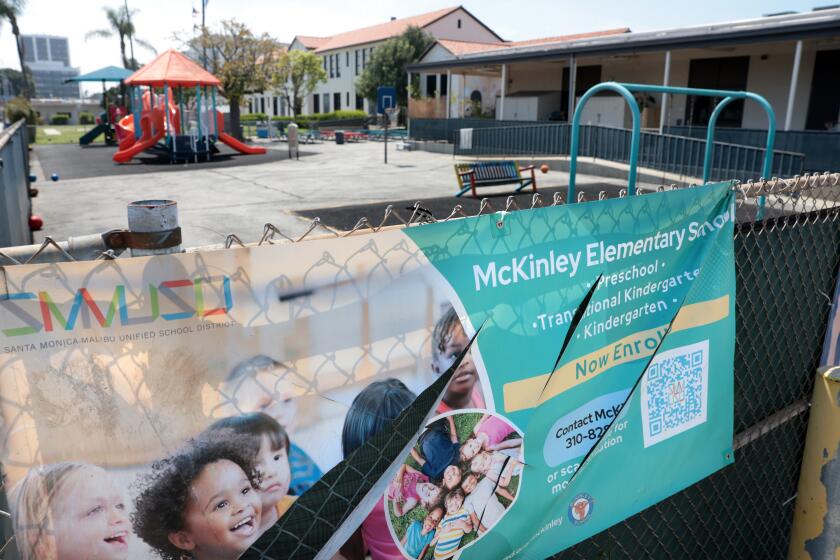Agassi to invest in charter schools
Former tennis star Andre Agassi has joined with Los Angeles bankers to create an unusual for-profit investment fund for construction of as much as $750 million worth of charter schools in urban communities across the country.
The goal of the fund is to develop 75 schools serving 40,000 students over the next three or four years while earning a financial return for investors, which include Citigroup Inc. and Intel Corp.
“It’s a novel business model,” said investment banker Bobby Turner, fund manager at Canyon Capital Realty Advisors. His Century City firm is Agassi’s partner in the Canyon-Agassi Charter School Facilities Fund.
“We expect to attract investors who realize that making money and making societal change don’t have to be mutually exclusive,” Turner said.
The fund’s first campus, in North Philadelphia, is scheduled to open in August. It will be part of the Knowledge Is Power Program, a network of free, open-enrollment, college-preparatory public schools. Charter schools are public schools that operate independently of local school boards.
It’s uncertain whether the fund will provide financing for any Southern California charter schools. Real estate here is more expensive than in many other urban markets, and California provides less funding per pupil than some other states do.
The fund “does need to be in areas that have higher revenues per student than California does for the most part,” said Anita Landecker, executive director of ExED, a Los Angeles nonprofit that manages charter schools and isn’t involved with the Canyon-Agassi fund. “In some markets it’s going to work really well.”
Agassi, who retired from tennis in 2006 after winning eight Grand Slam singles titles, has made education a focus. He operates the Andre Agassi Foundation for Education and the Andre Agassi College Preparatory Academy in Las Vegas.
“It’s been one of the most rewarding experiences of my life but also quite a frustrating one,” Agassi said of his academy. “I have 650 kids in school and 1,500 on the waiting list.”
The discrepancy is common for charter schools that are well regarded by the public, Turner said. Operators routinely have difficulty securing learning facilities because real estate is pricey. Traditional school funding sources -- public spending and philanthropy -- aren’t sufficient to pay for construction on the scale Agassi and Turner hope to achieve.
“The only way to make a dent is to attract additional for-profit capital,” Turner said. The fund is expected to raise up to $300 million, which would be leveraged through borrowing to secure as much as $750 million for school investments.
The fund would build facilities or retrofit existing properties that would be rented to charter school operators at what Turner called an “affordable” rate with the intention of eventually selling the facilities to the operators.
Accredited schools receive a certain amount of state funding per pupil. As new charter schools grow, they become financially more secure. By the fourth or fifth year of operation they should be stable enough to borrow tax-exempt money at a low interest rate from the municipal bond market and buy the school from the fund.
“What our fund does is provide a bridge to ownership,” Turner said.
Investors in the fund profit from the rent and sale. Turner declined to say what the rate of return is expected to be, adding only it would be “market rate.”
The fund’s investors are “a very diverse group of institutional investors, university endowments, family foundations and pension funds,” Turner said. Anchoring the fund are Citibank, Intel Capital and the Ewing Marion Kauffman Foundation.
“Citi is proud to play a key role in this inspiring partnership,” said Vikram Pandit, chief executive of Citigroup, the largest investor in the fund.
Another investor is former Los Angeles Mayor Richard Riordan, who also served as state secretary for education. “This is a way to make some money and help charter schools,” he said. “Then the money I make I can give back to charity. It’s sort of a way to have your cake and eat it too.”
Intel has spent more than $1 billion to improve education worldwide, said Arvind Sodhani, executive vice president of Intel and president of the company’s investment arm, Intel Capital. “We believe that every student should have access to a high-quality learning environment.”
Agassi’s commitment to education is the result of his own academic experience -- or lack of it. He said he often felt intellectually intimidated while traveling the world on the tennis circuit.
“I am a ninth-grade dropout,” he said. “I turned pro at 16 and felt profoundly throughout my life the results of my education.”
Overseeing the day-to-day operation of the new fund is Glenn Pierce, the former chief executive of Pacific Charter School Development, a Los Angeles nonprofit that develops charter school facilities.
If their fund is a success, Agassi and Turner say, they hope it will spawn more for-profit investing in school facilities. “Once it’s proven to be a sustainable model, there is no telling how far this can go,” Agassi said.
Riordan will wait to see how it performs.
“Sometimes you get too much of a good thing,” he said. “My suggestion would be to wait awhile and see if this works and if there is an appetite for it in the rest of the country.”
--







